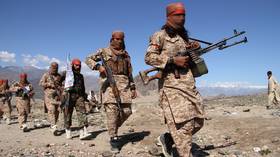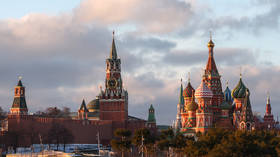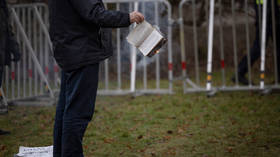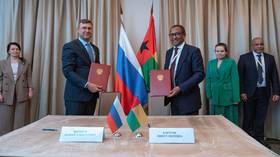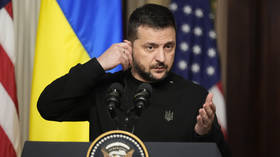As US troops are flown out of Afghanistan, the graveyard of great empires is now once again at the center of a battle for Eurasia
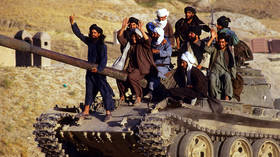
Two decades on, the US government’s escapade in Afghanistan is now drawing to a close. However, history shows the troubled Central Asian nation is unlikely to disappear from the headlines anytime soon as a great global crossroads.
In early July, American and coalition forces left Bagram Airfield, once Washington’s largest base of operations in Afghanistan. Already at 90% completion, the withdrawal is expected to be concluded by August 31, 2021, ahead of President Joe Biden’s initial September 11 deadline. Meanwhile, Taliban forces are advancing, recapturing and, crucially, holding lost territories, claiming to now control roughly 85% of the country.
There are plenty of theories about the timing of the pullout, and the effects it will have. But a closer look at history shows this isn’t just about Afghanistan, but the whole of Eurasia’s struggles and rise.
Civilizational chauvinism
Throughout its long history, Afghanistan has repeatedly found itself subject to invasion by various empires and kingdoms. Whilst there were periods of stable rule over the country, it has gained a reputation for its unconquerability, earning the title ‘graveyard of empires.’ Resisting foreign invasions, the theory goes, has become ingrained into the cultural psychology of the Afghan people.
The First Anglo-Afghan war of 1839 saw the British invade and install a friendly ruler, Shah Shujah Durrani, alongside sweeping reforms that sought to establish a centralized government and standing army according to the British model, whilst also supposedly tackling corruption. This attempt at state-building prompted rebellion from the Ghilzai warlords, who declared a jihad in September 1841. By 1842, the British were forced to withdraw. There would be two more Anglo-Afghan wars, both ending much like the first.
In 1979, the Soviet Union invaded Afghanistan in an attempt to preserve communist rule, deposing and replacing its leader. Just as the British attempted to build Afghanistan into a friendly nation-state over a century prior, the Soviets attempted to reorganize the socialist party and its dominance over the country.
With support from the US, the Afghan Mujahideen resisted the Soviet invasion, prolonging what was intended to be a brief stabilization mission into a decade-long war. Though the Soviet Union invaded at a moment of relative prosperity in the late 1970s, by the time of its withdrawal in 1989 a global paradigm shift was already underway. The collapse of socialism across the Eastern Bloc pronounced the end of Soviet civilizational chauvinism, of which the campaign in Afghanistan was a symptom.
The Soviets abandoned their war in Afghanistan at the historical departure from the bipolar Cold War era to the liberal unipolar world order, which continued to crystallize throughout the 1990s. During this time, the neoconservative thinker Francis Fukuyama famously contemplated the “end of history,” as he and others like him believed the collapse of the Soviet bloc had ushered in Western, liberal hegemony. As that triumphalism peaked at the turn of the millennium, the United States would launch its own venture into Afghan lands.
Underlying America’s war in Afghanistan was the same ideological motivation that inspired previous invasions by foreign powers, namely, to fashion an Afghan state in the conqueror’s image. The American political establishment was intent on carrying out a nation-building exercise that would end the state of disarray that Afghanistan had fallen into by 2001, despite more recent claims which attempt to play down the idea they had planned to leave anything substantive in place behind them.
By conquering the unconquerable and turning the ancient world’s hinterland into a 21st-century liberal democracy, the US would have been able to cement its position as the progenitor of history’s end. Yet, after two decades and an estimated cost of $2.26 trillion, the Taliban are in a strong position as the American-backed government in Kabul loses its grip on the country. The grave has been dug out and the headstone is marked, and perhaps the end of America’s Afghan expedition indicates that the world has once more reached a critical point of departure from the previous order of things.
The twilight of Eurasia
When he’s not busy blocking journalists on Twitter, Portuguese political scientist Bruno Macaes writes. In his book ‘The Dawn of Eurasia’, he articulates what he believes to be a shift of the geopolitical center of gravity from West to East as a result of China’s rapid growth and Russia’s resurgence to international prominence after its economy gradually improved from its 1990s nadir.
The coming global arrangement of power will, according to Macaes, consist of multiple poles, or actors, entering into competition and cooperation with one another, which is in contrast to the post-1990 era of Western, neoliberal/neoconservative globalization and America as the world’s police.
Crucial to understanding the developments taking place in Eurasia are entities such as the Shanghai Cooperation Organization (SCO), the Collective Security Treaty Organization (CSTO), and the Eurasian Economic Union, as well as Chinese investment projects, most notably the Belt and Road initiative. Already, these are showing signs of playing a significant role in Afghanistan’s post-war environment.
China has long sought to incorporate Afghanistan into Belt and Road as the missing link connecting the Eurasian supercontinent. In early July 2021, a Taliban spokesman openly referred to China as a friend, promising protection for Chinese investors coming to Afghanistan.
Also on rt.com Britain willing to ‘come to terms’ with Taliban and work with enemy for sake of peace if it ‘behaves’, UK defence secretary saysSimultaneously, Taliban representatives met with Iranian officials in Tehran where they reiterated the militant group’s commitment to a political settlement with the Kabul government, reassuring listeners elsewhere. Iran is already an observer at the SCO, and plans to grant full membership are still on the table.
That said, Russia, China and the Central Asian ‘-stan’ countries are concerned that a sudden withdrawal of US forces could deteriorate the security situation in Afghanistan, particularly when it comes to terrorist groups such as the Eastern Turkestan Islamic Movement (ETIM) and Islamic State (IS/formerly ISIS)-Khorasan. In January 2021, the current SCO secretary general, Vladimir Norov, said that IS and Uighur groups operating in Syria were shifting militants to northern Afghanistan.
Meetings have already taken place in Tashkent, Uzbekistan and Dushanbe, Tajikistan to discuss closer cooperation, the Afghan peace process and regional security. In Dushanbe, the SCO-Afghanistan Contact Group held a special meeting at the foreign minister level regarding the facilitation of peace talks.
Afghanistan has come into the spotlight for the same reason it always has – it sits at a historical crossroads, and although one can see the outlines of a Eurasian future for the war-torn country, the peace needed to realize it remains anything but certain.
The empire strikes back
Afghanistan will continue to be an area of strategic importance for the US political establishment. Though the troop withdrawal is in full swing and the aforementioned trends, both historical and contemporary, point towards the possibility of a change in the global order, the US still has outstanding, long-term objectives in Afghanistan.
In a 2018 speech at the Ron Paul Institute, Lawrence Wilkerson, who was chief of staff to former secretary of state Colin Powell, stated that America’s military presence in Afghanistan is its only hard power projection that “sits proximate to [China’s] central Belt and Road initiative” and that if the US had to “impact that with military power, we are in a position to do so in Afghanistan.”
If this was accepted by the Bush administration, under which Wilkerson served, then it continued to be a strategic point of consideration for Barack Obama. At a 2011 visit to Chennai, India, then-secretary of state Hillary Clinton called for a “new Silk Road” consisting of “rail lines, highways, energy infrastructure… to run from Turkmenistan, through Afghanistan, through Pakistan into India.”
Also on rt.com Sanctions against Taliban could be lifted as part of Afghan peace process, top Russian diplomat tells RT in wake of US withdrawalUltimately, Clinton’s “new Silk Road” never came to pass, perhaps because it was not necessary to begin with. The US does not have to build bridges – let alone a Democratic nation-state – if the goal is to erode China’s ability to use Afghanistan for its Belt and Road.
If neighboring countries’ worst fears materialize and the country falls into civil war, it would almost certainly undermine infrastructure and trade projects connecting East and West. A Libya-style scenario would also provide a smokescreen for continuing mercenary and intelligence operations throughout Afghanistan, as well as create a hotbed for terrorist activity that would put the entire region in an uncomfortable position, and which could be used as justification for redeploying US forces at any time.
The geopolitical tug of war that has found its battleground in Afghanistan has been called the “Great Game.” In this game, America’s military withdrawal is likely to be just the latest move, and it still isn’t clear who the winner will be, and at what cost their success will come for the Afghan people.
Like this story? Share it with a friend!
The statements, views and opinions expressed in this column are solely those of the author and do not necessarily represent those of RT.
The statements, views and opinions expressed in this column are solely those of the author and do not necessarily represent those of RT.
